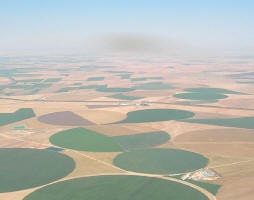 Drought-tolerance: a learning challenge for poor farmers
Drought-tolerance: a learning challenge for poor farmers
Drought-tolerant crops could improve food security — if researchers take downstream adoption challenges seriously, says Travis Lybbert.
Few aims have attracted as much attention and investment from private, public, academic and philanthropic sectors in recent years as drought tolerance (DT) in agriculture. In the past decade, more than US$1 billion has been spent on DT research and investment shows no signs of letting up.
With climate change, growing water insecurity and renewed concerns about food security in the wake of recent price spikes, the potential welfare gains from effective DT crops are enormous.
In rainfed regions of Australia and North America, investments in DT are expected to bring large private profits. Among the poor in developing dryland areas, gains from DT could make the difference between survival and starvation. During a drought, DT could limit catastrophic losses and help households recover more quickly.
Many proponents argue that adopting DT varieties may also allow poor farmers to become more entrepreneurial and diversify their livelihoods.
All these prospective DT benefits not only hinge on transferring lab results to farmers' fields, but also on farmers being able to see these benefits for themselves — which may be particularly tricky for smallholder farmers.
REFERENCES
[1] Lybbert, T.J. and Bell, A. Stochastic Benefit Streams, Learning and Technology Diffusion: Why Drought Tolerance is not the new Bt. AgBioForum13(1) (2010)
| Contact information |
Travis J. Lybbert is assistant professor of agricultural and resource economics at University California, Davis in the United States.
|
|---|---|
| News type | Inbrief |
| File link |
http://www.scidev.net/en/opinions/drought-tolerance-a-learning-challenge-for-poor-farmers.html |
| Source of information | Scidev.net |
| Subject(s) | AGRICULTURE , RISKS AND CLIMATOLOGY |
| Relation | http://www.emwis.net/topics/WaterScarcity |
| Geographical coverage | n/a |
| News date | 22/07/2010 |
| Working language(s) | ENGLISH |
 you are not logged in
you are not logged in





